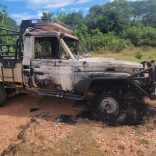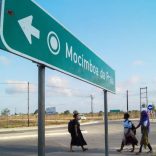Mozambique: Drugs valued at almost 50 million meticais seized in the first half of 2025
Mozambique: Rebellion in north ‘in decline’ but risks not eliminated – analysts

File photo: Lusa
The rebellion in the north of Mozambique that began six years ago “is losing war power” and “declining” but the risks of “prolonging the conflict” have not yet been eliminated, according to analysts in comments to Lusa.
The province of Cabo Delgado completes this Thursday (October 5, 2017) six years since the first attack by armed groups in the district of Mocímboa da Praia.
READ: Individuals allegedly linked to Al Shabaab attack police station in Mocímboa da Praia – Mozambique
Mocímboa da Praia rocked by riots since dawn today – Mozambique
At least two policemen killed in Mocímboa da Praia attacks – PRM
Armed men attack police stations in Mocímboa da Praia – AIM report
Speaking to Lusa on Wednesday, researcher João Feijó, from the Observatório do Meio Rural NGO, told Lusa that he considered “the insurgency [to be] gradually losing military power and logistics capacity, and some leaders”.
Feijó said that government forces, together with the military from Rwanda and the Southern African Development Community (SADC), managed to expel armed groups from areas they occupied in Cabo Delgado and halt the growth of the insurgency.
“In general, all [military contingents] are relatively satisfied,” he emphasised.
João Feijó pointed out that the rebels reached an offensive capacity that allowed them to paralyse the natural gas project of the consortium of the French multinational Total when they attacked the town of Palma in March 2021, occupying the headquarters of the district of Mocímboa da Praia and locations in several districts in the north of Cabo Delgado.
The rebels, he continued, “arrived in armoured vehicles that they had captured” from the Defence and Security Forces (FDS).
Feijó noted that the action of Mozambican and foreign government forces ensured that the insurgents were driven away from areas rich in natural resources, especially the district of Palma, which will host the liquefied natural gas transformation complex of the TotalEnergies consortium.
Despite advances in the military field, Feijó continued, the Mozambican government “does not claim victory”, because it knows that the insurgents can “reinvented themselves”, acting in smaller, more mobile groups.
“They continue to operate in secret, in a very discreet manner, and still have capabilities that have not yet been completely eliminated,” he emphasised.
The researcher criticises the lack of progress in removing the social, economic and cultural causes that favoured the recruitment of young people by armed groups in Cabo Delgado.
The management of the situation in Cabo Delgado “is not just limited to military pressure” and “the response [in the social, economic and cultural dimensions] is very timid and unconvincing”, Feijó says.
Borges Nhamire, a researcher at the Institute for Security Studies (ISS Africa), argues that the insurgency is in “decline” because of the action of government forces, but the persistence of the causes of the conflict in Cabo Delgado threaten “the prolongation of the war”, even if it is of “low intensity”.
“The conflict is declining, because Mozambique has much more military capabilities, it has much more soldiers on the ground, the conflict has reduced,” but “the causes that facilitated the emergence of the conflict in north-eastern Cabo Delgado have not been resolved,” Nhamirre comments.
Hostility between the main ethnic groups, lack of youth employment training and the absence of support for professional activities continue, he adds.
The ISS Africa researcher notes that social and economic inequalities in areas affected by violence in Cabo Delgado remain significant, exposing young people to recruitment by armed groups.
“These inequalities were exacerbated by the discovery of natural resources, because people were recruited from other areas of Mozambique and other countries for research and the exploration of these resources,” Nhamirre stressed.
READ: Gunmen terrorise Mocímboa da Praia again – Rádio Moçambique













Leave a Reply
Be the First to Comment!
You must be logged in to post a comment.
You must be logged in to post a comment.